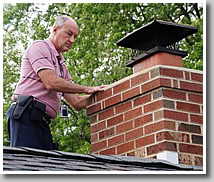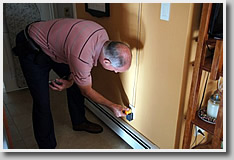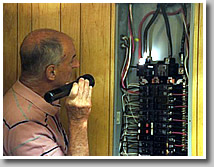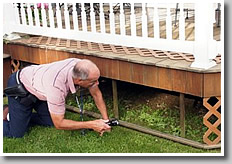Information for Home Buyers

The home inspection is an objective assessment of the home, both inside and outside. Here, Larry inspects the roof and chimney of a house in Plymouth Meeting.
You made an offer on a house, it was accepted and you just signed the agreement of sale, what should you do next? Take a deep breath, then start thinking about the investment you are making.
You probably looked at many homes, but there was something appealing about this home, something that attracted you. The home had the number of bedrooms and bathrooms you were looking for. The kitchen had been updated, the basement was finished, the other living spaces were suitable for your lifestyle and you could put your car in the garage and never have to go outside, in the rain, to get in it. So at the moment, everything just seems to be perfect about this house.
Protect Your Investment
The investment in a home is generally one of the largest, most people make in their lifetime. That said, you want to protect that investment, so you need to schedule an inspection. Buyers do not see, nor are they looking at what the home inspector sees. The home inspector is not looking for a house to buy, he is looking at the house to protect your investment. It is a small price to pay for peace of mind.
That roof over your head, is it leaking?… Are there tell-tale signs of repairs, or is it so old that a replacement will be necessary in the near future? Like most people, you will probably be stretched to the limit by the time you leave settlement and can ill afford to spend thousands on a new roof after you move in.

The home inspection includes the examination and testing of all readily accessible outlets, switches, fixtures, circuit breakers, and GFCI outlets throughout the home.
There can be issues with the construction materials, lack thereof, or how they were used in building the home. There are electrical and mechanical systems that need to be operated to insure they are functional and safe. Even newly constructed homes can have serious defects that can cost thousands of dollars to repair and should be inspected.
Generally, all the systems, working components, major appliances are operated during the home inspection.
The home inspection report will cover all of these items and highlight any that are deemed defective due to safety or health issues,
as well as anything that might cost in excess of $500.00 to correct.
Minor issues, where some repair or corrective action is required to make the condition right, are also listed.
Information that will allow you to make sound decisions during this phase of the home buying process.
More >> What is a home inspection?
Can I Do This Myself?
What about that corroded pipe under the sink, that funny noise the heater makes, or the water stain under the window sill? Are these things signs of normal wear and tear or are they tell-tale signs of serious problems down the road? As a NAHI certified Home Inspector, we are trained to know the difference.

Checking the inside of an electrical panel for improper wiring and hazards during a home inspection in Lansdale, PA.
Do all the switches, outlets, faucets, and appliances work?… Is the electrical system safe or overloaded?… Do I have enough insulation?… Are the heating and cooling systems working properly?… Are all of the doors and windows in good working order and do they seal well?
If you are now saying to yourself, I didn’t even think of some these issues, let alone all the many other areas and items not even mentioned, it is time for you to schedule a home inspection. Not only will everything be in the inspection report, there are also some helpful hints for maintaining and operating the home and systems that will be mentioned both during the inspection and in the inspection report.
Most importantly, you could save yourself a great deal of money and regrets, by knowing the condition of the property before going to settlement. A professionally prepared home inspection report can be used to negotiate to have the owner agree to make repairs/replacements.
Learn About Your Home
Home Buyers are not required to be present during the home inspection, however, tagging along with your home inspector is time well spent. The home inspection is an opportunity for you to learn about the systems and components that make up your home.
For instance, many buyers are not aware of the tilt-in convenience of the newer windows or how they work. This is important to know, so that you can avoid getting up on a ladder to wash the exterior side of the window; instead, just tilt it in and wash it from inside, no matter what floor you are on. Questions like: Where the filter is for the HVAC system and how to change it?… What is the purpose of that unit next to the well tank?… and do I need to shut off the water to the outside for the winter? How do I care for my deck, my driveway, my siding?… Your home inspector is a great resource for learning this valuable information and more!

Many mortgage companies require Wood Destroying Insect Inspections. Here, Larry prepares to inspect the underside of a deck near Collegeville, PA.
Specialty Inspections
There are additional inspections that home buyers should be aware of, some of which are required by mortgage lenders. Each of these individual tests and inspections can be arranged through Profile Inspections, LLC in conjunction with your home inspection.
WDI - Most buyers will generally want to get a termite inspection for their new home. The inspector is not only looking for termite damage, past or present, he is looking for any type of insect that can cause damage to the property. That is why this inspection is referred to as a wood destroying insect (WDI) inspection. Whether or not the condition is active or evidence of treatment is visible will be reported. This is a relatively inexpensive inspection, considering the costs involved in repairing untreated, excessive damage to structural members of the property
Radon - Radon is another commonly requested inspection. Radon is an odorless gas, resulting from the decaying uranium/radium in the ground beneath your home. It is the number two cause of lung cancer. Testing is the only way to determine if the home is below or above a safe level. The test is relatively inexpensive given the possible life threatening consequences if humans are subjected to prolonged exposure. Newer homes that are located over an active source, may be more susceptible to higher levels present, because they are built a lot tighter and don’t breathe as well as an older home.
Lead Testing - Testing for lead might be something to consider in homes that were built before 1978, the year that lead was no longer permitted in paints. Homes that may contain lead paint, even if not tested, should avoid any disturbance of surfaces during renovations and/or re-finishing of surfaces without testing and possible remediation.
Mold - If there was a concern about the presence of mold, a sample could be taken and tested; however, if the sample came back positive, further testing; including an air quality test, might be in order.
Water Testing - Water analysis might be a concern if the property is served by a well and can be easily tested with a collected sample.
Be Protected, Get it Inspected!

Remember, the home inspection report is an objective assessment of the visible condition of the property at the time of the inspection. The knowledge you will gain by following the home inspector and reading the inspection report will help you make the necessary decisions as you move forward with negotiations and purchase of the property.
Contact us if you have any questions or to Order an Inspection.
Return to top of page
©2025 Profile Inspections, LLC
![]() 7 Colton Drive
7 Colton Drive
![]() Plymouth Meeting, Pennsylvania 19462
Plymouth Meeting, Pennsylvania 19462
![]() 610.279.6161
610.279.6161


